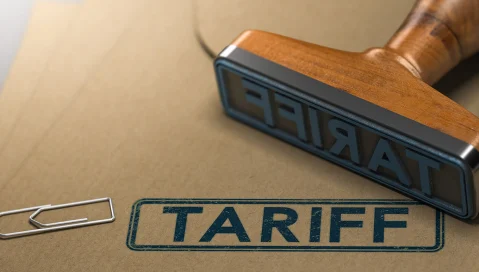Why ERP Software is a Critical Part of Consumer Goods Importers’ and Distributors’ Success during the Ongoing Tariff Conflict
Why ERP Software is a Critical Part of Consumer Goods Importers’ and Distributors’ Success during the Ongoing Tariff Conflict
Why ERP Software is a Critical Part of Consumer Goods Importers’ and Distributors’ Success during the Ongoing Tariff Conflict
Nov 12, 2019
John Weber
The retaliatory tariffs between the United States and China have had a dramatic impact on global economics, but the ripples of their rhetoric have affected businesses on a smaller scale too. While these two massive countries debate the price of trade, mid- to small-size consumer goods importers and distributors feel the heavy impact of their dialogue. The tariff war has created a real sense of uncertainty when it comes to the future of business owners’ bottom lines.
The most recent tariff implementations will raise the existing 25% tariff to 30% on $250 billion of Chinese imports. And someone somewhere has to pay for it. The price increase will either be passed onto the retailers, the consumers, or it’ll be consumer goods importers who swallow the additional fees. The latter of the three will likely absorb a portion of the additional cost, if not all of it. This puts importers and distributors in a difficult position, as they’ll be the ones who have to make changes within their business operations to accommodate the new costs.
In response to the US tariffs on $125 billion of Chinese goods, in September Beijing announced it would impose $75 billion in tariffs on US goods. According to analysis, from London economists, the tariff increase cost American families an additional $460 annually. This specifically involves everyday purchasing products like cereal bowls or paintbrushes or pajamas. That’s a pretty steep increase. It hurts the family, the retailer, and it really hurts you—the consumer goods distributor/importer.
During these uncertain times, there are a couple of proactive steps you can take to try to manage this uncertainty. You can figure out the best possible practices when it comes to your business, that way when the tariffs do affect your bottom line, you’ll have a better idea about how to absorb those additional costs. What was working before, may not work so well right now; so it’s important to evaluate old practices, even if they worked well once, to find new, inventive ways to offset the impact of the tariffs on your bottom line.
The Right Tools for an Uncertain Future
The details of the “Phase 1” trade talks between the US and China are unknown. Will some tariffs be canceled? Will new tariffs be enforced? There’s so much that has yet to be determined, and because you have all of these unseen, uncontrollable variables affecting your business, running a financially-stable, effective corporation, no matter the size, is more challenging than ever before.
And as a consumer goods importer/distributor, that’s really frightening. To help you prepare for this kind of ambiguity, visibility into all the goings-on in your business is essential. A consumer-goods specific ERP, like Aptean Distribution ERP, grants you that kind of visibility. Aptean Distribution ERP is a consumer-goods software solution on which you can lay a strong foundation so that you can better navigate an uncertain future.
Simply, tariffs lead to cost increases and pressure on your business. This means smaller margins. When trying to discover how your business can absorb the additional costs of tariffs, you need complete visibility into your business. In having that kind of oversight you’ll be able to better determine two things:
Your business’s true profitability
Best practices when it comes to running your business efficiently
Your Business’s True Profitability
Visibility is essential for profitability. Knowing exactly where your costs are—labor costs, freight charges, duty, broker fees, whatever it may be—can help you make the smartest decisions on behalf of your business and your bottom line. The visibility of how all these costs convergence to affect profitability will better inform your decisions.
Understanding your company’s true profitability used to be this onerous, painstaking process that involved hours of manual number-crunching. It was a complex, manual process that left plenty of room for human error. Thankfully that’s not really true anymore. Using a software solution built specifically for organizations that import and distribute consumer goods, tools like the Profitability Scorecard, will allow you to easily analyze your costs all in one place and platform. With the insights and intelligence gained from the oversight in this kind of system, you’ll be able to create a strong sense of awareness about the profitability of your business— where you can absorb some costs, where can you make certain efficiencies, and then where it’s necessary to make certain adjustments and changes.
With this software you can easily see and understand the profitability by product, retailer, and supplier– so you have visibility into the real costs of doing business with each of your trading partners. The real-time data you receive will better inform your decisions and allow you to create a more efficient operation.
Best Practices to Running Your Business Efficiently
Efficiency and visibility go hand-in-hand. Visibility into your consumer goods importing/distributing business—what’s done really well and where areas of improvement lie—allows you to better manage your business and make the most responsible fiscal decisions. A consumer-goods specific ERP will provide you with the key insights that you need to run your business efficiently, and in doing that, you’re sure to decrease costs.
Best practices in your warehouse and forecasting and planning become ever-critical because, with the tariffs, you now have additional cost pressures. There is a smarter way to do things, and an ERP can help you figure out your best practices. In the fast-paced world of consumer goods distribution, however, you don’t have the time to stop, evaluate your process flows, and then figure out how to improve. With a purpose-built ERP solution, you don’t have to. Aptean has already done the legwork for you and built-in industry best-practice process flows.
Adapting to the New Normal
The tariff conflict isn’t likely to resolve itself anytime soon, and while political powerhouses spar over specific percentages, your bottom line will be affected. The only thing left to do is acclimate.
Investing in a smart, industry-specific software solution is a good step in the right direction. It won’t solve the global economic problems, but it will allow you to better prepare for the current challenges you’re facing. Our purpose-built distribution ERP, Aptean Distribution ERP, will allow you to manage your imported goods from foreign countries, ensure you’re meeting retailer requirements, and keep up with the increasing demand for direct-to-consumer fulfillment.
For more information about how you can determine your true profitability, schedule a demo today.
Ready to start transforming your business?
We’ve got the specialized ERP solutions you need to conquer your industry challenges.



